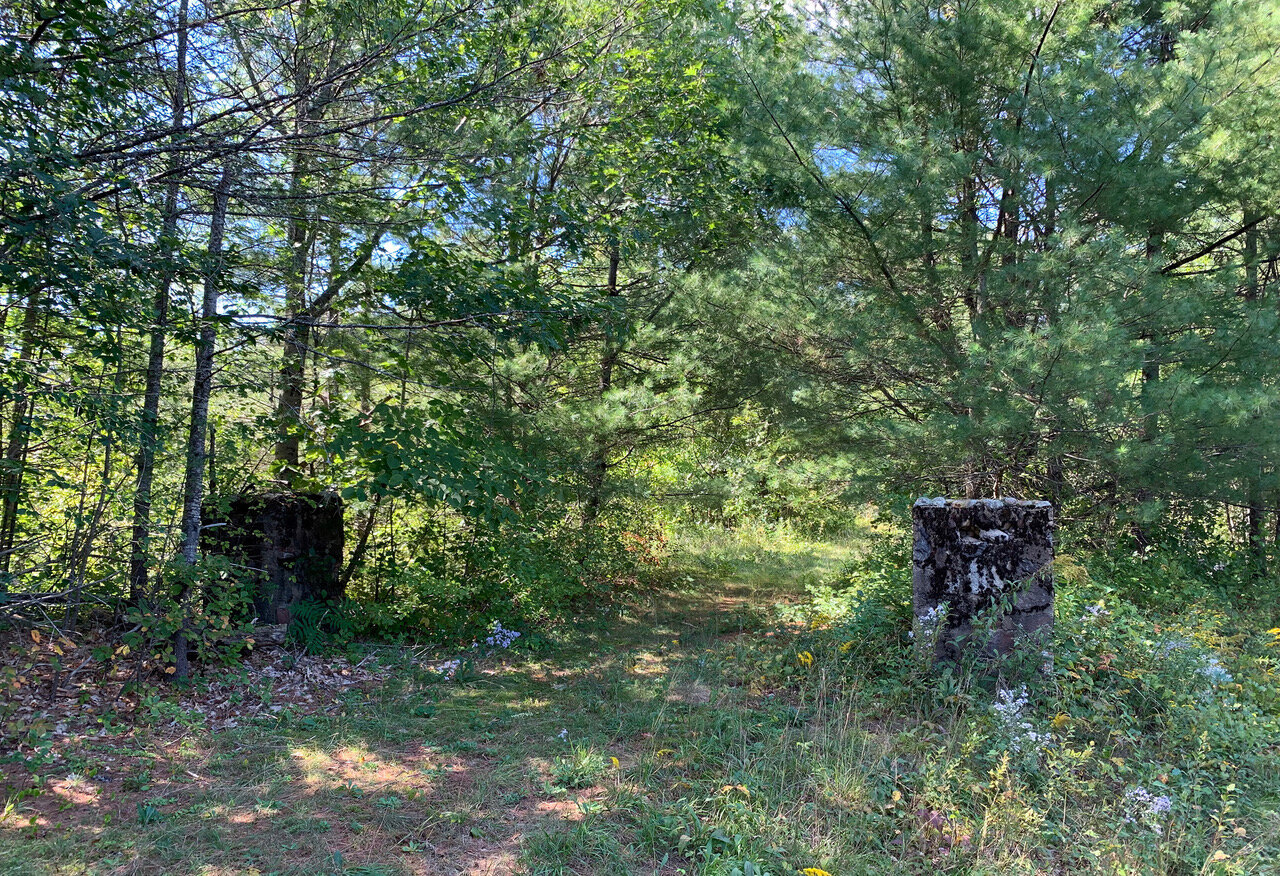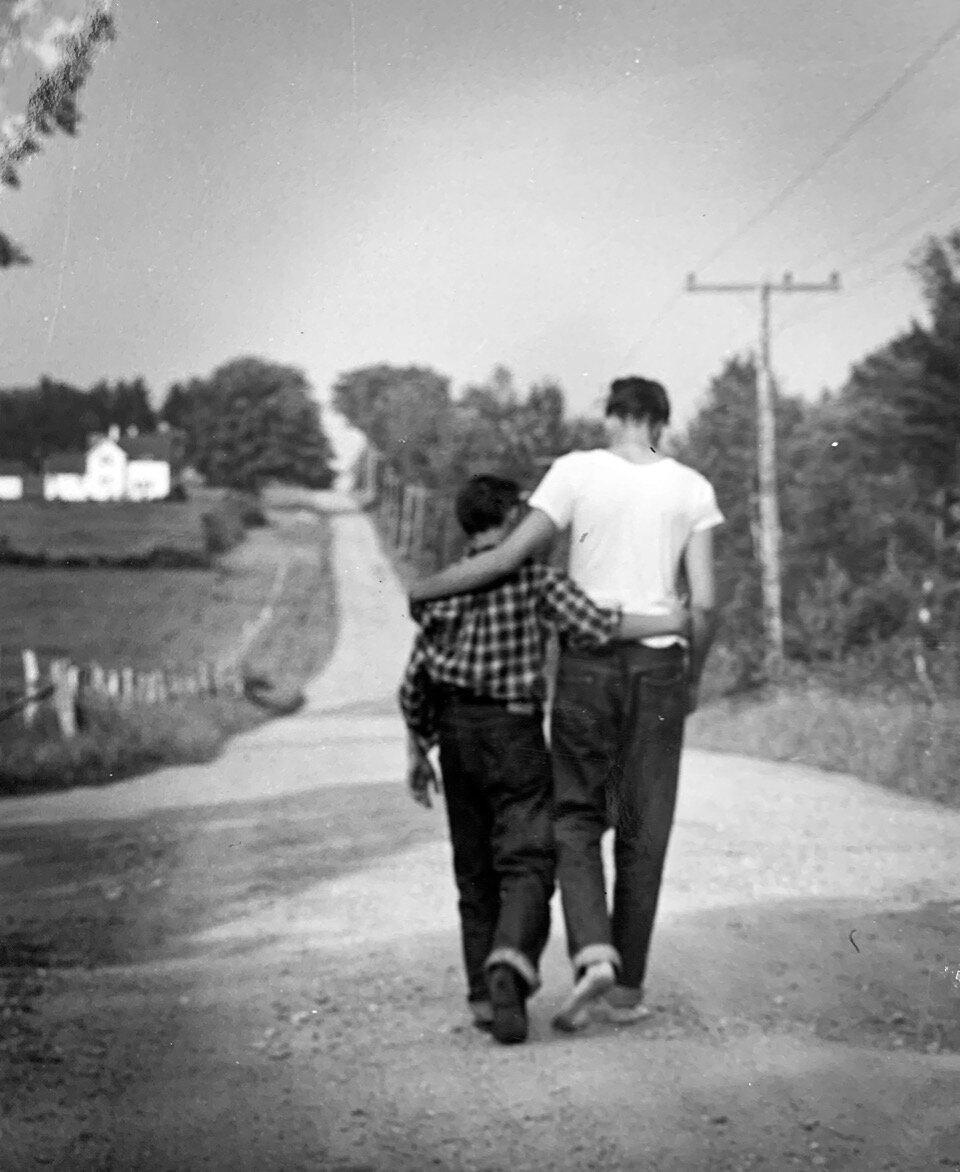Golden Rule Farm Served as a State’s ‘Boys Town’
Boys of all ages received education and life skills at the Golden Rule Farm. (Spaulding File Photo)
Golden Rule Farm Served as a State’s ‘Boys Town’
By Thomas P. Caldwell
Stone columns and a historical marker on an abandoned road are the only physical remains of a unique program that aimed to prepare young men (and a few young women) for adulthood in the early 20th century, but the legacy of Franklin’s Golden Rule Farm lives on, meeting other needs, in the form of Spaulding Academy and Family Services in Northfield.
The intriguing story of the Golden Rule Farm actually begins 150 years ago with the establishment in 1871 of the New Hampshire Orphans’ Home, later known as the Daniel Webster Home for Orphans, on Elms Farm, the estate owned by Daniel Webster’s family and the place where New Hampshire’s famous orator and statesman grew up.
A young resident of Golden Rule Farm pitches hay. (Spaulding File Photo)
The Orphan’s Home was established through the efforts of Rev. Daniel Augustus Mack, who had been orphaned at age seven and who, as a chaplain during the Civil War, had received entreaties from dying soldiers to look after their children. The orphanage was established by an act of the state legislature in 1871, and the board of directors purchased the Webster farm that October.
Two stone gate posts are all that remain of the Golden Rule Farm in Franklin, forced to relocate when the Franklin Falls Dam was built. (Tom Caldwell Photo)
The Golden Rule Farm grew out of the work of another pastor, Rev. George W. Buzzell, who received a gift of the 100-acre Roberts Farm in 1901. It had been the home of Daniel Webster’s sister. Buzzell established a cottage-style housing arrangement for orphans and taught them life skills in what first was known as the Bradley Memorial Home. When, in 1914, it was joined to the Golden Rule Homestead, which increased the size of the property to 400 acres, it became the Golden Rule Farm.
Situated in the Pemigewasset Valley between the towns of Hill and Franklin, it gave orphans the opportunity to experience farm life. Ledgers from the early years contain entries about the children brought there from homes where there was an unwed mother or a widowed father unable to care for his children, or a child was simply left on the doorstep.
A sample entry: “a babe 8 months old — Husband gone — Child illegitimate.”
Golden Rule Farm adapted as the need for orphanages declined and the needs of urban children facing corrective situations grew, and the rehabilitation of juvenile delinquents became a major focus. Golden Rule Farm began taking in troubled boys who had problems at home or run-ins with the law, giving the place the reputation of being New England’s Boys Town — a reference to Father Flanagan’s Boys Home where the priest offered an alternative to reformatories and other juvenile facilities.
Nurses care for some of the orphans in this file photo in the archives of Spaulding Academy and Family Services.
At a time when many such facilities abused child inmates or used them as slave labor, the Golden Rule Farm took a caring approach. The children were put to work, but the emphasis was on teaching them useful skills. They received an education, participated in group activities, and learned what they would need to know to make it in life. Records from Golden Rule Farm showed instances where the directors protected their charges from farmers looking to adopt a son with the likely intention of using the child as free labor. The administrators simply said no boys were available.
The work of Golden Rule Farm caught the attention of many people who would become supporters of the institution, including the actress Bette Davis, who had a residence near Franconia in Sugar Hill, New Hampshire.
Residents of the Golden Rule Farm learned skills they could use later in life, including working with electronics. (Spaulding File Photo)
When the Franklin Falls Dam was built in 1939, it forced the relocation of Hill Village and the residences within the flood control area, and Golden Rule Farm was one of places forced to find a new home. That new home was to be situated on the Boynton and Holquist farms in Northfield.
At the time, Boston Herald writer Bill Cunningham wrote of the home’s mission and its plight:
The Golden Rule Farm is a project in the rehabilitation of the American boy — maybe repossessing would be a better word. It’s not a reformatory. It’s not a refuge for the afflicted nor the feeble minded. It takes strong, sound, manly, potentially valuable American citizens whose family background has gone to smash for some reason, and gives them what every kid in this land has need of if he’s to grow up loving it and believing it and ready to stand squarely in the harness for it — a real, warm hearted and very personal home. …
It faces a crisis of sorts at the moment. It has to move. Its current premises near Franklin are exactly in the way of a flood control project ordered by the federal government, and although it’s taken what should prove to be a better location near Tilton, it needs to fit up the new place with the necessary buildings and all, and, in the days of Aid to Britain, Help the Chinese, Buy Defense Bonds, and all the mighty and clamorous rest, the thin, clear call of a boyish American voice is likely to be drowned in the general confusion.
The necessary money came through, and Golden Rule Farm had its new home. Then, in August 1941, there was a devastating fire that broke out in a hay barn. Again, Cunningham wrote of the problem:
The breeze threw the flames swiftly over the bunk house next door where some 30 of the young gentlemen were quartered and the whole thing went in a roar while the little fellows stood helplessly across the road, many of them in tears.
The Golden Rule Farm in Franklin. (Spaulding File Photo)
The Farm had insurance — all it could get — but you can’t get much on farm property completely away from fire plugs, and this was not only complete loss of quarters. It was loss of clothing as well. … That fine and friendly place has 50 boys to care for and at present it has accommodations for only 15. The rest are currently living in tents provided by the Red Cross and friendly people of Tilton and Franklin. … The neighbors and the kind folks of New Hampshire in general have rallied around in this way and that, but cold weather’s coming. Those kids need a couple of buildings. … How about some quick and real help for our very own?
Once again, supporters did come through, and Golden Rule Farm was able to remain in operation until 1958 when it merged with the Daniel Webster Home for Orphans and became Spaulding Youth Center. The merger had been talked about for years, and in April 1958, the boards of directors of both institutions appointed committees to work out the details.
Like its predecessor institutions, Spaulding Youth Center adapted to the changing needs of children. In 1970, Spaulding adopted behavior management as its major focus, reflecting the needs of children with emotional problems. In 1988, it completed construction of the Cutter-Wiggins Trauma Unit, aimed at helping those with traumatic brain injuries.
Troubled boys could find structure and friendship at the Golden Rule Farm in Franklin. (Spaulding File Photo)
In 2004, Spaulding began assisting with the placement of children needing foster care and it later would take on the training of people interested in becoming foster parents. In 2012, Spaulding opened a new, high-performance school able to provide specialized programs and services for children and youths, including those with autism.
The last couple of years marked a new phase for Spaulding when it opened a new cottage called Wednesday House in 2020, to provide a place for students whose homes were unsafe due to their parents’ drug use or neglect. The students are able to attend public school during the day but have a safe place to stay when school is not in session.
In short, from the time the New Hampshire Orphans’ Home opened, the institution now known as Spaulding Academy and Family Services has identified and responded to the biggest unmet needs in the state of New Hampshire. Golden Rule Farm was an important part of that journey, and those former residents who are still living today recall their time there with fondness.
Golden Rule Farm taught the young residents about farm life and gave them skills they could take into adulthood. (Spaulding File Photo)








